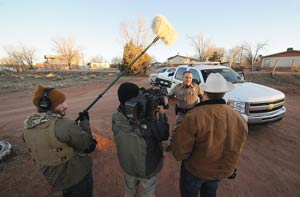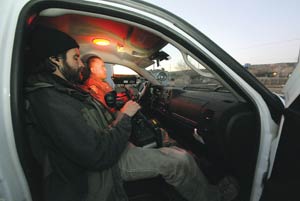Delegates question revenue from 'Navajo Cops'
By Glenda Rae Davis
Navajo Times
WINDOW ROCK, June 28, 2012


(File photo - Donovan Quintero)
TOP: Navajo Nation Police officer Wendell Bitselley speaks to the film crew from the National Geographic Channel Jan. 13 in Ganado.
SECOND FROM TOP: Alex Diamantakos, with the National Geographic film crew, films Navajo Nation Police officer Wendell Bitselley Jan. 13 in Ganado.
T
he Navajo Nation Council's Law and Order committee was given a report on Monday concerning revenue from the "Navajo Cops" television series, which aired on the National Geographic Channel earlier this year.
Broadcast Services Director Kee Long, on behalf of the Navajo Nation Film Office, presented the report.
"We just wanted to find out where the money was going," said Council Delegate Edmund Yazzie (Church Rock/Iyanbito/Mariano Lake/Pinedale/Smith Lake/Thoreau), who is chairman of the committee.
Yazzie also expressed hopes that part of the money would be given directly to the Navajo Nation's law enforcement program.
"We want to make sure the police department gets their fair share," he said.
The report focused solely on permit fees that were collected by the film office resulting in approximately $4,000 for each episode.
Any money collected from the fees is deposited into the nation's general fund.
Long said that all commercial film and photography projects have to get permits from the film office in order to film on the Navajo Nation.
When asked for expenditure reports, Long said that the film office permit states that the company is "to furnish a complete and accurate financial Navajo Nation Film Office Expenditure Report upon completion of the cinematographic and/or photographic activities."
"I talked to the producer, Sam Dolan," said Long. "He said that he would provide (the report) at the completion of the project."
Long said that one permit was still in effect until November of this year.
There were two other Council delegates present at the meeting, Alton Joe Shepherd (Cornfields/Ganado/Jeddito/Kin Dah Lichíí/Steamboat) and Elmer P. Begay (Dilkon/Greasewood Springs/Indian Wells/Teesto/White Cone).
Shepherd was concerned about additional revenue coming to individuals and parties involved from guest appearances, DVD sales and/or promotional merchandise.
He asked if there was something in the agreement that stated that all revenue should be put back into the nation's general fund.
"Any financial contribution should go back to the nation," Shepherd said.
Long answered that there were no direct indications within the agreement of what was to happen to additional money gained by individuals and parties involved but that the nation and the production company were protected by copyright infringement laws.
Shepherd advised that stipulations ensuring the correct image of the Navajo Nation be projected should be included in future filming agreements.
Long will follow up with expenditure reports for each permit, excluding one that has not expired from Dolan at a future Law and Order committee meeting, said Yazzie in a follow-up interview.
"The police department needs all the money they can get to keep officers on the street," said Yazzie.
"The show promotes our law enforcement," he said. "It shows what our officers go through, compared to urban officers are at a higher standard. For our officers, most of the time, they don't have backup."
The "Navajo Cops" show is a reality TV series about the Navajo Nation Police. Flight 33 Productions produced it for National Geographic Channel.
The program began as a one-hour pilot episode, which aired in March 2012, but was extended into a six-episode series.

